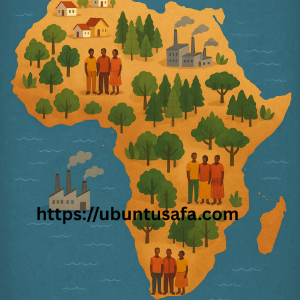Are Chinese-run zones in Africa creating parallel economies where locals are excluded from meaningful participation?

Chinese-Run Zones in Africa: Catalysts for Growth or Parallel Economies-
China’s establishment of Special Economic Zones (SEZs) and Economic and Trade Cooperation Zones (ETCZs) across Africa has been a significant aspect of its engagement with the continent.
These zones are designed to attract investment, foster industrialization, and create employment opportunities.
However, concerns have arisen regarding their impact on local economies, particularly regarding the potential creation of parallel economies where local communities are excluded from meaningful participation.
The Nature of Chinese-Run Zones in Africa
Chinese-run zones in Africa are typically characterized by Chinese ownership and management, with a focus on manufacturing and export-oriented industries. These zones often benefit from favorable policies, such as tax incentives, infrastructure development, and relaxed regulatory environments, aimed at attracting Chinese enterprises. While these zones have led to the creation of jobs and infrastructure development, the extent to which they integrate with the local economy varies significantly.
Exclusion of Local Communities
1. Limited Employment Opportunities
In many instances, the employment opportunities within Chinese-run zones are limited for local populations. Studies have indicated that while these zones create jobs, the majority of the managerial and technical positions are occupied by Chinese nationals, with local workers primarily filling low-skilled roles. This disparity limits the potential for skill development and upward mobility among the local workforce.
2. Isolation from Local Economies
The operational models of Chinese-run zones often result in economic activities that are isolated from the broader local economy. These zones may import raw materials from China and export finished products directly to international markets, with minimal interaction with local suppliers or markets. This lack of integration hinders the development of local supply chains and reduces the potential for knowledge and technology transfer.
3. Cultural and Social Disconnect
The management practices and corporate cultures of Chinese enterprises may differ significantly from local norms and practices. This cultural disconnect can lead to misunderstandings and tensions between Chinese employers and local employees, affecting workplace dynamics and social cohesion within the surrounding communities.
Potential Creation of Parallel Economies
The characteristics of Chinese-run zones—such as their focus on export-oriented production, reliance on Chinese management, and limited integration with local economies—can contribute to the development of parallel economies. These parallel economies operate alongside the local economy but are distinct and often disconnected, leading to disparities in economic development and access to resources.
Implications for Sustainable Development
1. Limited Economic Spillovers
The lack of integration between Chinese-run zones and local economies means that the potential economic benefits, such as job creation, technology transfer, and infrastructure development, are not fully realized by the surrounding communities. This limits the broader impact of these zones on sustainable development in host countries.
2. Social Inequality
The exclusion of local populations from meaningful participation in Chinese-run zones can exacerbate social inequalities. Without access to quality employment and opportunities for skill development, local communities may remain marginalized, hindering efforts to achieve inclusive economic growth.
3. Challenges to Governance
The operation of Chinese-run zones often involves complex governance structures that can be challenging for local authorities to oversee effectively. This can lead to issues related to accountability, transparency, and the enforcement of labor and environmental standards, undermining the potential benefits of these zones.
While Chinese-run zones in Africa have the potential to contribute to economic development, their current operational models often result in the creation of parallel economies that exclude local communities from meaningful participation. To ensure that these zones contribute to sustainable and inclusive development, it is essential to implement policies that promote the integration of local economies, enhance employment opportunities for local populations, and foster greater cultural understanding between Chinese enterprises and local communities.
- Questions and Answers
- Opinion
- Motivational and Inspiring Story
- Technology
- Live and Let live
- Focus
- Geopolitics
- Military-Arms/Equipment
- Sécurité
- Economy
- Beasts of Nations
- Machine Tools-The “Mother Industry”
- Art
- Causes
- Crafts
- Dance
- Drinks
- Film/Movie
- Fitness
- Food
- Jeux
- Gardening
- Health
- Domicile
- Literature
- Music
- Networking
- Autre
- Party
- Religion
- Shopping
- Sports
- Theater
- Health and Wellness
- News
- Culture

